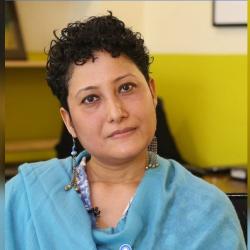Deteriorating air quality in the Hindu Kush Himalayas (HKH) region and the resulting impacts requires urgent attention from governments, policy makers, scientists, stakeholders and the public. Atmospheric issues are often neglected at policy making and local levels. The Atmosphere Initiative at ICIMOD, realizing the media’s important role in raising public awareness is organizing a training workshop for journalists to increase their understanding of the issues and complexities surrounding air pollution, its sources and impacts, and mitigation options.
Established in 2013, the Atmosphere Initiative of ICIMOD is a part of the Regional Programme on Cryosphere and Atmosphere. It aims to improve our understanding of atmospheric issues and promote regional cooperation for addressing issues relating to air pollution in the HKH region.
Objectives
- To increase journalists’ understanding of air pollution sources, atmospheric processes, impacts, mitigation options, and policy options.
- To provide journalists with the tools (understanding and knowledge of where to find further resources) needed to convey to the public new scientific findings and data on air quality.
- To encourage journalists to seek out new stories on air pollution related issues and report them with scientific accuracy.
- To encourage transboundary collaboration among journalists to work on transboundary air pollution issues.
- Orient journalists about effective reporting on air pollution issues, case studies, and how air pollution affects the development of mountain areas and communities.
About the Programme
Highly motivated journalists working with various media outlets (including print, radio, television, and online) from ICIMOD’s regional member countries – Afghanistan, Bangladesh, Bhutan, China, India, Nepal, Myanmar and Pakistan – will be brought together through this workshop. The workshop will be facilitated by a senior reporter.
This four-day long workshop will allow them to have better understanding of regional air pollution, its sources and impacts, atmospheric processes, mitigation options, and policy options. Scientists and other specialists will teach the participants about atmospheric science with emphasis on air pollution, its sources and impacts, and mitigation options with specific relation to the Hindu Kush Himalayan (HKH) region. By the end of the workshop, the participants will be required to share their story ideas and exchange views with fellow journalists, facilitators, and scientists to discuss and to get the facts right.
A comprehensive programme will be dedicated to familiarize and to discuss the issue and techniques for information gathering. Detailed presentations by scientists on atmospheric sciences are an attraction of this workshop that offers the participants to clarify and enhance their understanding of issues related to air pollution. The field trip organized as part of the workshop will bring a journalistic perspective to the unrecognized human aspects of the problems associated with air pollution. The workshop will serve as an opportunity to clarify and correct common misconceptions related to air pollution, and also provide journalists with the background knowledge needed to correctly interpret scientific data and present scientific findings to the general public, and to incorporate new perspectives into their articles. By the end of the workshop, the participants will have developed stories aimed at publishing through their respective media houses.
Benefits of being part of the workshop
- Each participant will produce/publish at least two stories on issues related to air pollution
- Journalists will emerge from the workshop with increased knowledge on atmospheric issues and confidence in developing stories on its impacts on people in the HKH region
- Journalists will be equipped with techniques to better report and enhance their stories with human perspectives/dimensions while ensuring scientific accuracy
Guidelines for applications
Interested candidates may apply using the online application form no later than 16 August 2015. The following information will be requires while submitting the form:
- An updated curriculum vitae (max. 2 pages)
- A written statement indicating the reason for applying and describing your area of interest within the prospect of atmospheric science (In English, no more than 200 words)
- At least three clippings/links to relevant, recently published news reports or stories
- A signed and stamped letter from the editor of a reputable publishing or broadcast agency indicating an interest in publishing or broadcasting the project story
Eligibility
- The training workshop targets journalists from ICIMOD’s regional member countries - Afghanistan, Bangladesh, Bhutan, China, India, Nepal, Myanmar, and Pakistan.
- Journalists working in all forms of media outlets, including print, radio, television, and online, may apply.
- Personal motivation for reporting on air pollution and other atmospheric issue and its implications.
- Both full-time and freelance journalists can apply.
- Applicants should have covered stories on air pollution in the past.
- Journalists working in non-English media are welcome to apply, but must indicate proficiency in English as it is the working language of the training workshop.
Selection Process
All applications will be reviewed by a selection committee from ICIMOD. Only successful applicants will be notified via email by 11 September 2015. An automated email and display will appear on your screen after your application is successfully submitted.
- 7025 reads








Add new comment